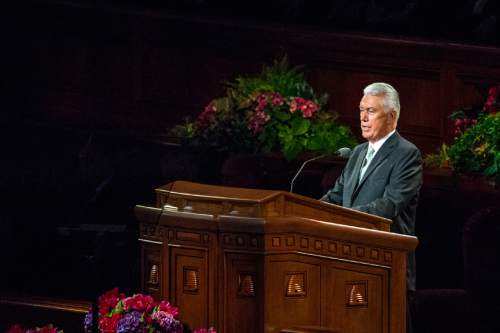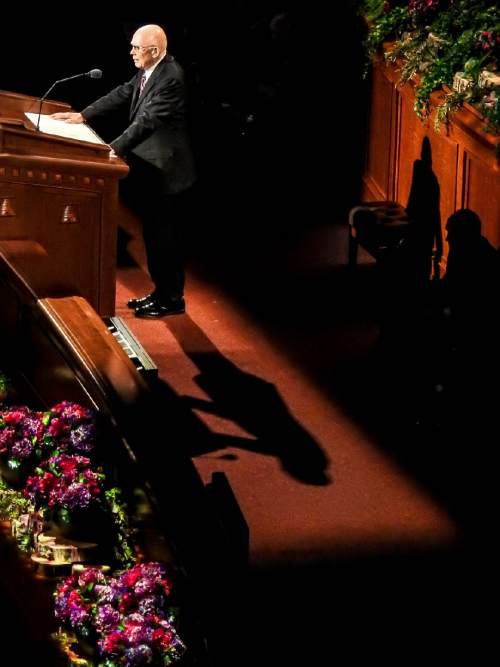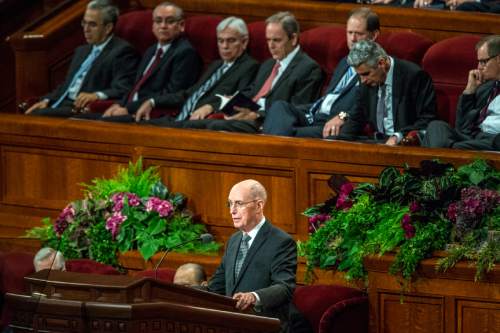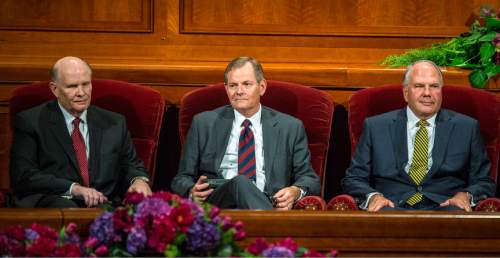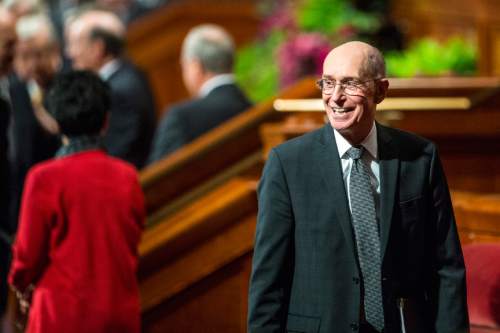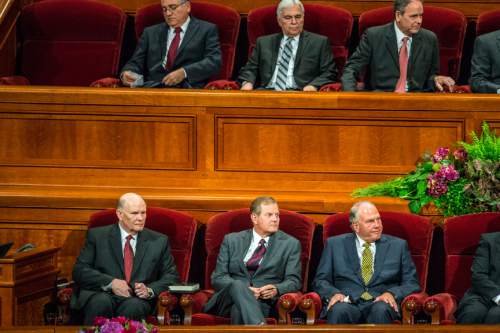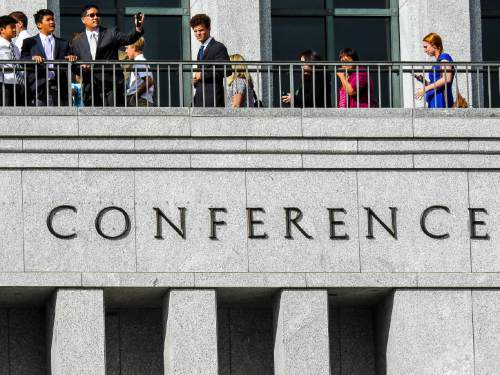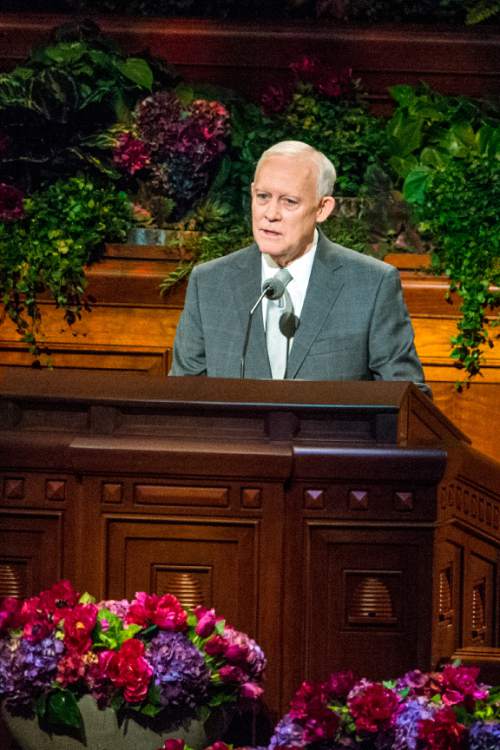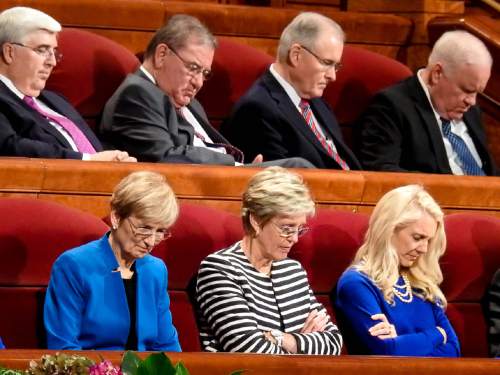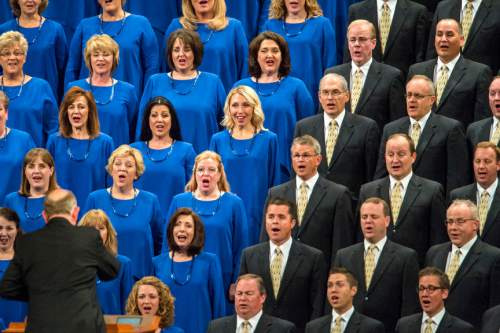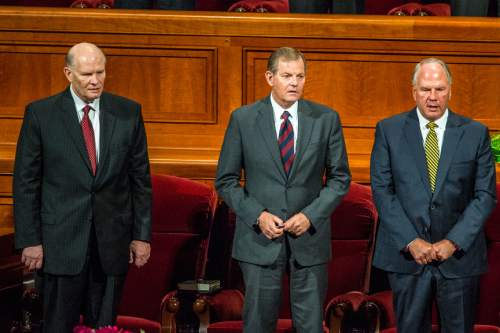This is an archived article that was published on sltrib.com in 2015, and information in the article may be outdated. It is provided only for personal research purposes and may not be reprinted.
In a touching tribute to mothers from biblical times to the modern era, Mormon apostle Jeffrey R. Holland praised from the pulpit Saturday the supreme mom of Mormon theology: Heavenly Mother.
"To all of our mothers everywhere, past, present or future, I say, 'Thank you for giving birth, for shaping souls, for forming character and for demonstrating the pure love of Christ,' " Holland said. "To mother Eve, to Sarah, Rebecca and Rachel, to Mary of Nazareth and to a Mother in Heaven I say, 'Thank you for your crucial role in fulfilling the purposes of eternity.' "
Mormons believe not only in God the Father but also God the Mother — though top leaders rarely speak so publicly, so pointedly and so movingly about her, especially during the faith's twice-yearly General Conferences.
An LDS apostle for more than two decades, Holland compared the work of mothers to that of Jesus.
"Today," he said, "I declare from ... what has been said here before: that no love in mortality comes closer to approximating the pure of love of Jesus Christ than the selfless love a devoted mother has for her child."
Holland quoted a young mom who called maternal love divine — and an essential element of Christ's work. He also related the story of a mother who supported her son through his struggles with same-sex attraction to see him "come home to the promised land."
"This son's sexual orientation did not somehow miraculously change — no one assumed it would," he said. "But little by little, his heart changed.
The son went on to become worthy to enter Mormon temples (which are reserved for the faith's most sacred rites), Holland said, and return to an LDS mission he had left early.
Here are summaries of other key talks from Saturday's morning and afternoon sessions at the LDS Conference Center in downtown Salt Lake City:
AFTERNOON SESSION
Robert D. Hales • The apostle, who has suffered health ailments for several years, called on Mormon young people to tighten their grip on the word of God and make today their "day of choosing."
"You are living through a critical period of your life," he said. "The choices you make — mission, education, marriage, career and service in the church — will shape your eternal destiny."
He told the youths to ask themselves, "if I make this choice, what is the worst thing that could happen?" He said God would guide them through prayer, the scriptures, the teachings of living prophets, inspired parents and leaders, and the voice of the Holy Ghost.
Hales specifically warned young Latter-day Saints against the consequences of debt. He admonished them to pay their tithing, save and live within their means. He also encouraged students to seek out scholarships, grants or part-time jobs to obtain an education while avoiding debt.
He called on young Mormons to date actively, encouraging them to "learn everything you can about each other."
"Speaking plainly," Hales advised, "please don't date all through your 20s just to 'have a good time' thus delaying marriage in favor of other interests and activities. Why? Because dating and marriage aren't final destinations. They are the gateway to where you ultimately want to go."
Bradley D. Foster • A member of the Seventy, Foster warned LDS children that the world was engaged in a battle for their identity and minds.
"We must win this battle," he said. "Everything depends on it."
Foster called the Mormon youngsters the largest group of investigators and asked members what they were doing to cause the lasting conversion of their kids.
He told parents that it is never too early or too late to teach their children the gospel.
Hugo Montoya • Trials and temptations are universal, said the member of the Seventy, but humans were never meant to carry these burdens alone.
"We have a responsibility to help each other," Montoya said.
He encouraged Mormons to smile often, serve in the temple, express compassion for others, meditate on the love of Christ weekly and invite others to attend church.
Vern P. Stanfill • Mormons may sometimes find themselves facing spiritual challenges for which they are not prepared, said the member of the Seventy.
But Stanfill said he has learned that he determines the intensity of the darkness and the length of its duration by waiting to call out for help.
"While we are struggling in the darkness," he said, "there is nothing wrong with relying temporarily upon the light of those who love us and have our best interests at heart."
At the same time, Stanfill said, members should consider carefully where they seek help, and should avoid the "faceless, cynical voices … of those who have no light to give or who may have private agendas hidden from us."
James B. Martino • A member of the Seventy, Martino spoke of his own conversion.
When he first prayed about the faith's signature scripture, the Book of Mormon, he wasn't looking to change his life and received no answer. He later received an answer, he said, and learned why he had not the initially.
God answers prayers, Martino said, "when we have a sincere heart, with real intent. He does not answer just to respond to our curiosity."
Martino said conversion required a continued attitude of obedience and cautioned that those who do not develop certain spiritual habits — scripture study, fasting, prayer — may forget their past experiences and turn away from the faith.
Dallin H. Oaks • An apostle for 31 years and second in line for the church's presidency, Oaks spoke of the potential for Christ's atonement to heal humanity's pains, sicknesses and infirmities.
"He therefore knows our struggles, our heartaches, our temptations, our suffering, for he willingly experienced them all as an essential part of his atonement," Oaks said. "And because of this, his atonement empowers him to succor us — to give us the strength to bear it all."
Sometimes the power of Christ heals infirmities directly, the apostle said, but other times he offers the strength or patience needed to endure an infirmity.
Everyone, at some point, will experience one of these infirmities, Oaks said. Some will experience sickness, injury,or mental challenges. Others will fail to fulfill personal responsibilities to family or employers. Some parents will watch their children or spouse reject the church; others will be rejected directly themselves, and some will be left single and alone.
The Savior, Oaks said, has experienced it all and offers the strength to overcome.
Oaks emphasized addiction, which he called a crippling disability. He said an addiction may remain even after repentance, but promised members that addictions can be overcome through Christ.
"Our Savior is able to comfort, heal and strengthen all men and women everywhere," he said, "but I believe he will only do so for those who seek him and ask for his help."
MORNING SESSION
Dieter F. Uchtdorf • The second counselor in the governing LDS First Presidency opened the Saturday morning session with a sermon on the simple truths that form the basis of Mormon teachings.
He said personal study was valuable, but cautioned members against disregarding truth in favor of "more mysterious or complicated information."
Uchtdorf challenged Latter-day Saints to ask themselves if their experience with the church is working to bring them closer to Christ. If it was not, he suggested two actions to improve their religious experience: Simplify their discipleship, and accept themselves despite their current faults.
"Sometimes we take the beautiful lily of God's truth and gild it with layer upon layer of man-made good ideas, programs and expectations," he said. "Each one, by itself, might be helpful and appropriate for a certain time and circumstance, but when they are laid on top of the other, they can create a mountain of sediment that becomes so thick and heavy that we risk losing sight of that precious flower we once loved so dearly."
Uchtdorf said LDS leaders "must strictly protect the church and the gospel in its purity and plainness and avoid putting unnecessary burdens on our members."
M. Russell Ballard • An apostle for nearly 30 years and third in line for the faith's presidency, Ballard reminded Mormons to "stay on the old ship Zion."
"Our Heavenly Father and the Lord Jesus Christ have outfitted the old ship Zion with clear and simple eternal truths," he said, "that will help us stay the course through the troubled waters of mortal life."
Ballard said members can rely on church guidance because the faith continues to be led by divinely inspired prophets and apostles, preaches God's purpose for life, centers its beliefs in the importance of family and provides opportunities for inspirational Sunday worship.
"I have been a personal witness as both quiet inspiration and profound revelation have moved to action the prophets and apostles, the other general authorities, and the auxiliary leaders," he said. "While neither perfect nor infallible, these good men and women have been perfectly dedicated to leading the work of the Lord forward as he directs."
Ballard said "too many people think church leaders and members should be perfect or nearly perfect."
"They forget that the Lord's grace is sufficient to accomplish his work through mortals," he said. "Our leaders have the best intentions, but sometimes we make mistakes. This is not unique to church relationships, as the same thing occurs in our relationships among friends, neighbors and workplace associates and between spouses and in families.
"Looking for human weakness in others is rather easy," he added. "However, we make a serious mistake by noticing only the human nature of one another and then failing to see God's hand working through those he has called."
Richard J. Maynes • A member of the Presidency of the Seventy, Maynes emphasized the importance of living a Christ-centered life.
He related the story of an artist in a small mountain village in Shikoku, Japan, who was asked to teach a Mormon youth group. The artist offered the youths a demonstration of making a bowl on a pottery wheel, and then asked if the students would like to give it a try. Most of the teens thought making a bowl would be simple, Maynes said, but all failed in their first attempt, because they did not place the clay in the center of the wheel.
"The world in which we live is similar to the potter's spinning wheel, and the speed of that wheel is increasing," Maynes said. "Like the clay on the potter's wheel, we must be centered as well. Our core, the center of our lives, must be Jesus Christ and his gospel."
Neill F. Marriott • The second counselor in the general presidency of the faith's Young Women organization for girls ages 12 to 17 said personal reformation begins with a change of heart. She emphasized the importance of learning of prayer and trusting the will of God.
"I have struggled to banish the mortal desire to have things my way, eventually realizing that my way is oh-so lacking, limited and inferior to the way of Jesus Christ," said Marriott, Saturday's first female speaker. "Can we love Jesus Christ and his way more than we love ourselves and our own agenda."
Larry R. Lawrence • A member of the Seventy, Lawrence said the LDS teaching that members can become like God implies continued learning and personal improvement.
But, he said, Mormons need to ask the Lord for direction along the way.
"The Holy Ghost doesn't tell us to improve everything at once," Lawrence said. "If he did, we would become discouraged and give up. The Spirit works with us at our own speed, one step at a time."
Francisco J. Viñas • A member of the Seventy, Viñas encouraged members who are struggling with challenges or disappointment to seek messages of hope in the scriptures.
He said this was also true for those who might suffer because of their own sins.
"For this type of suffering, the pleasing word of God also brings comfort and hope," Viñas said. "It tells us that there is relief from the pain caused by the effects of sin. This relief comes from the atoning sacrifice of Jesus Christ and takes effect if we exercise faith in him, repent and are obedient to his commandments."
But, he said, this relief is contingent upon genuine repentance.
Quentin L. Cook • The apostle urged Latter-day Saints to exercise self-control, honor the Sabbath and be righteous.
Members must obey the commandments of God at all times in life, he said, because happiness here and in the hereafter is tied to righteousness.
"All of us need to develop and demonstrate conduct and appearance that declare we are true followers of Christ," Cook said. "Those who abandon either righteous conduct or a wholesome, modest appearance expose themselves to lifestyles that bring neither joy nor happiness."
The apostle said false ideas in today's world suggest that one must choose between happiness now, in this life, or happiness later, in the next. He said the teachings of the world also imply that "what is moral has basically changed."
"From our limited perspective, current temptations and distractions can seem attractive," he said. "The rewards for resisting those temptations, on the other hand, can feel distant and unattainable. But a true understanding of [Heavenly] Father's plan reveals that the rewards of righteousness are available right now."
Cook also called the emphasis LDS leaders have placed on the importance of Sunday worship in the past six months "a most remarkable change" and challenged members to "continue to embrace this counsel, and improve our Sabbath worship."


